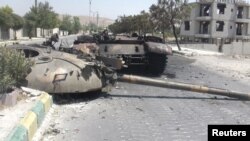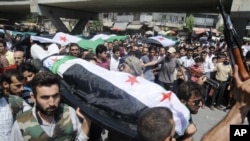France says it will push a new effort to address the crisis in Syria through the United Nations Security Council, which has been divided by camps wanting to exert pressure to end the ongoing violence and those declaring the situation an internal matter.
French Foreign Minister Laurent Fabius said Monday that France will request a Security Council meeting, "probably on the ministerial level," by the end of this week. France takes over the rotating Security Council presidency on Wednesday.
Fabius called Syrian President Bashar al-Assad an "executioner" and echoed fears of a possible massacre voiced earlier by the United States, Britain and the United Nations.
The opposition Syrian National Council on Sunday urged the Security Council to hold an emergency session on the situation in Syria's commercial hub, Aleppo, alleging that the government is planning to commit a massacre there.
The Security Council has voted three times on resolutions aimed at stopping the fighting in Syria. Russia and China, two of the Council's five permanent members, have vetoed each measure.
Continued fighting
Opposition activist groups reported continued fighting Monday between rebels and government forces in several parts of Aleppo. The Local Coordination Committees reported that three people were killed in Aleppo, while two others were killed in and around Damascus.
Syrian state media said Sunday that troops ousted rebels from the Salaheddine district of Aleppo, but there was no independent confirmation.
U.S. Secretary of Defense Leon Panetta, who is traveling to Tunisia, Egypt, Israel and Jordan for meetings on Syria, said Sunday that continued attacks by government forces will bring an end to Assad's government.
"If they continue this kind of tragic attack on their own people in Aleppo, I think it will ultimately be a nail in Assad's coffin," Panetta said.
Addressing concerns about Syria's chemical weapons arsenal, Panetta said the United States is working closely with Jordan, Turkey and other allies in the region.
"Our specific goal is to make sure that they are being secured and that they don't fall into the wrong hands," Panetta said. "And we've developed a very close and cooperative relationship that I think is helping us closely monitor that situation."
French Foreign Minister Laurent Fabius said Monday that France will request a Security Council meeting, "probably on the ministerial level," by the end of this week. France takes over the rotating Security Council presidency on Wednesday.
Fabius called Syrian President Bashar al-Assad an "executioner" and echoed fears of a possible massacre voiced earlier by the United States, Britain and the United Nations.
The opposition Syrian National Council on Sunday urged the Security Council to hold an emergency session on the situation in Syria's commercial hub, Aleppo, alleging that the government is planning to commit a massacre there.
The Security Council has voted three times on resolutions aimed at stopping the fighting in Syria. Russia and China, two of the Council's five permanent members, have vetoed each measure.
Continued fighting
Opposition activist groups reported continued fighting Monday between rebels and government forces in several parts of Aleppo. The Local Coordination Committees reported that three people were killed in Aleppo, while two others were killed in and around Damascus.
Syrian state media said Sunday that troops ousted rebels from the Salaheddine district of Aleppo, but there was no independent confirmation.
U.S. Secretary of Defense Leon Panetta, who is traveling to Tunisia, Egypt, Israel and Jordan for meetings on Syria, said Sunday that continued attacks by government forces will bring an end to Assad's government.
"If they continue this kind of tragic attack on their own people in Aleppo, I think it will ultimately be a nail in Assad's coffin," Panetta said.
Addressing concerns about Syria's chemical weapons arsenal, Panetta said the United States is working closely with Jordan, Turkey and other allies in the region.
"Our specific goal is to make sure that they are being secured and that they don't fall into the wrong hands," Panetta said. "And we've developed a very close and cooperative relationship that I think is helping us closely monitor that situation."





